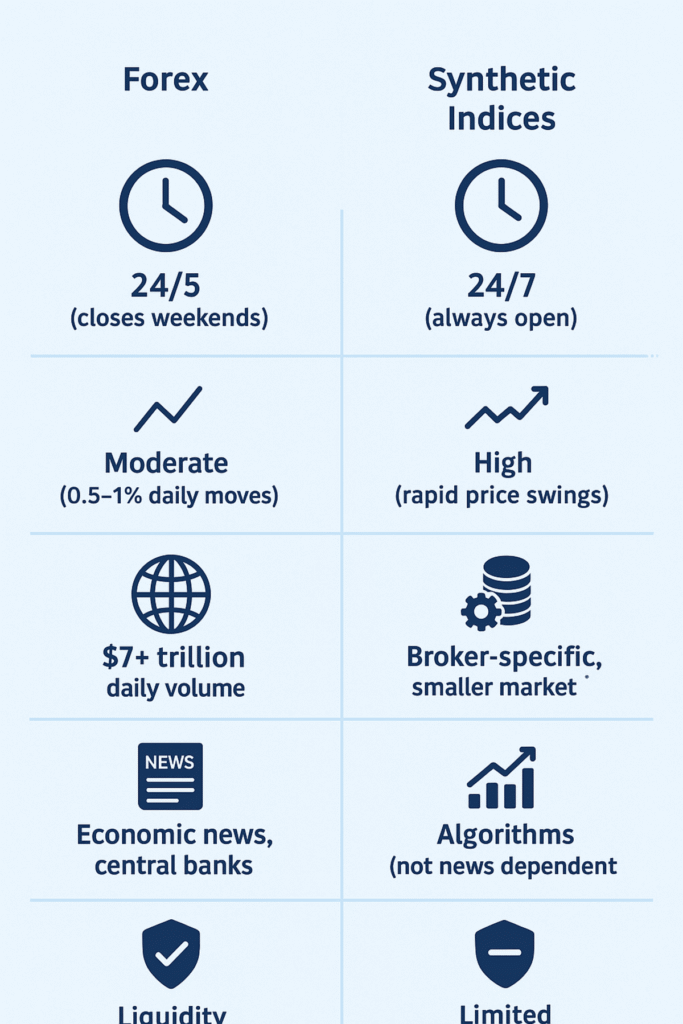When it comes to trading with a small account, two markets often stand out: Forex and Synthetic Indices. Both provide unique opportunities to grow capital, but they differ in structure, volatility, and accessibility.
Forex has been around for decades as the world’s largest and most liquid financial market. Synthetic indices, on the other hand, are relatively new and are computer-generated markets designed to replicate real-world volatility.
Key Summary: Forex vs Synthetic Indices for Small Accounts
- Forex is regulated, liquid, and influenced by global events.
- Synthetic Indices run 24/7 with fixed volatility and no external news.
- Small accounts can trade both, but success depends on strict risk management.
- Beginners may find forex more predictable, while synthetics suit traders who enjoy volatility.
- The best choice isn’t “forex or synthetic,” it’s the one that matches your style and discipline.
Forex vs Synthetic Indices: Which One is Better for Small Accounts?
If you’re trying to decide which one suits your small account best, let’s compare the two side by side.
Trading Hours
Trading hours play a big role for small account traders who want flexibility.
-
Forex operates 24 hours a day, 5 days a week. It follows four global sessions: New York, London, Tokyo, and Sydney. However, it closes during weekends, meaning traders cannot access the market from Friday evening until Sunday evening.
-
Synthetic Indices run 24/7 without interruption. Whether it’s midnight or a public holiday, you can trade these instruments at any time.
If you prefer consistency and non-stop trading, synthetic indices give more flexibility.
Market Structure
The structure of each market is also different.
-
Forex is influenced by global economic factors such as interest rates, inflation, and central bank decisions. It is regulated by financial institutions and involves banks, brokers, and governments. This regulation adds stability but also means it is subject to news events and political changes.
-
Synthetic Indices are algorithm-based and not tied to global events. Their price movements are generated by mathematical formulas, which makes them predictable in terms of volatility patterns but independent from external news.
For traders who dislike market uncertainty caused by breaking news, synthetic indices offer a neutral playing field.
Volatility and Price Movement
Price fluctuations determine how fast a small account can grow—or blow.
-
Forex tends to have moderate volatility, with daily price movements often between 0.5% and 1%. Larger swings usually occur during major news releases or economic events. This makes Forex relatively stable for long-term growth.
-
Synthetic Indices are known for high volatility, with rapid price movements that can multiply profits quickly but also increase risks. For small accounts, this can be both an opportunity and a danger.
If you want slower, steady growth, Forex may be safer. If you want fast-paced action, synthetic indices deliver it.
Market Size and Liquidity
Liquidity is important for order execution and spreads.
-
Forex is the largest financial market in the world, with a daily trading volume of over $7 trillion. Popular pairs like EUR/USD and GBP/USD are extremely liquid, ensuring smooth trade execution.
-
Synthetic Indices are smaller and broker-specific (e.g., Deriv), meaning their liquidity depends on the platform. While you can always enter and exit trades, spreads and volatility may be higher compared to Forex.
Regulation and Safety
-
Forex is heavily regulated across the world, with licensed brokers ensuring transparency, anti-fraud measures, and fair pricing. This makes Forex safer in terms of governance.
-
Synthetic Indices are unregulated in the traditional sense since they are artificial markets. Their safety depends on the credibility of the broker providing them. For example, Deriv is one of the most recognized providers.
| Feature | Forex | Synthetic Indices |
|---|---|---|
| Trading Hours | 24/5 (closes weekends) | 24/7 (always open) |
| Volatility | Moderate (0.5–1% daily moves) | High (rapid price swings) |
| Market Size | $7+ trillion daily volume | Broker-specific, smaller market |
| Influenced By | Economic news, central banks | Algorithms (not news dependent) |
| Liquidity | Extremely high (major pairs) | High but platform-specific |
| Regulation | Globally regulated | Limited (depends on broker) |
| Small Account Growth | Slow but steady | Fast but risky |
Which One is Better for Small Accounts?
The answer depends on your risk tolerance and trading goals:
- Choose Forex if you want regulated markets, lower volatility, and steady growth. It’s safer for building discipline with a small account.
- Choose Synthetic Indices if you want round-the-clock trading, consistent volatility, and faster growth potential—but be prepared for higher risk.
The Bottom Line
When comparing Forex vs Synthetic Indices for small accounts, there is no universal winner. Forex offers stability, regulation, and gradual growth, while synthetic indices provide speed, volatility, and 24/7 access. The best option depends on how much risk you’re willing to take and how disciplined you are with risk management.
FAQ on Forex vs Synthetic Indices
1. Which is safer for beginners?
Neither forex nor synthetic indices are completely “safe.” Forex has more liquidity and regulation, while synthetics run 24/7 with fixed volatility. Beginners should start small, focus on risk management, and only trade what they understand.
2. Can I trade both with a small account?
Yes, you can. Many traders diversify by trading both. The key is proper position sizing and discipline. Don’t over-leverage just because the account is small.
3. Are synthetic indices manipulated?
Synthetic indices are generated by algorithms and audited for fairness. They are designed to mimic real market behavior without being tied to real-world events.
4. Which one is more profitable?
Profit depends on your strategy and discipline, not just the instrument. Forex offers opportunities tied to global news, while synthetics move purely on volatility patterns.
5. Do synthetic indices work with forex strategies?
Yes, most price action, trend-following, and risk management strategies that work on forex also apply to synthetics. The main difference is volatility levels and market hours.

